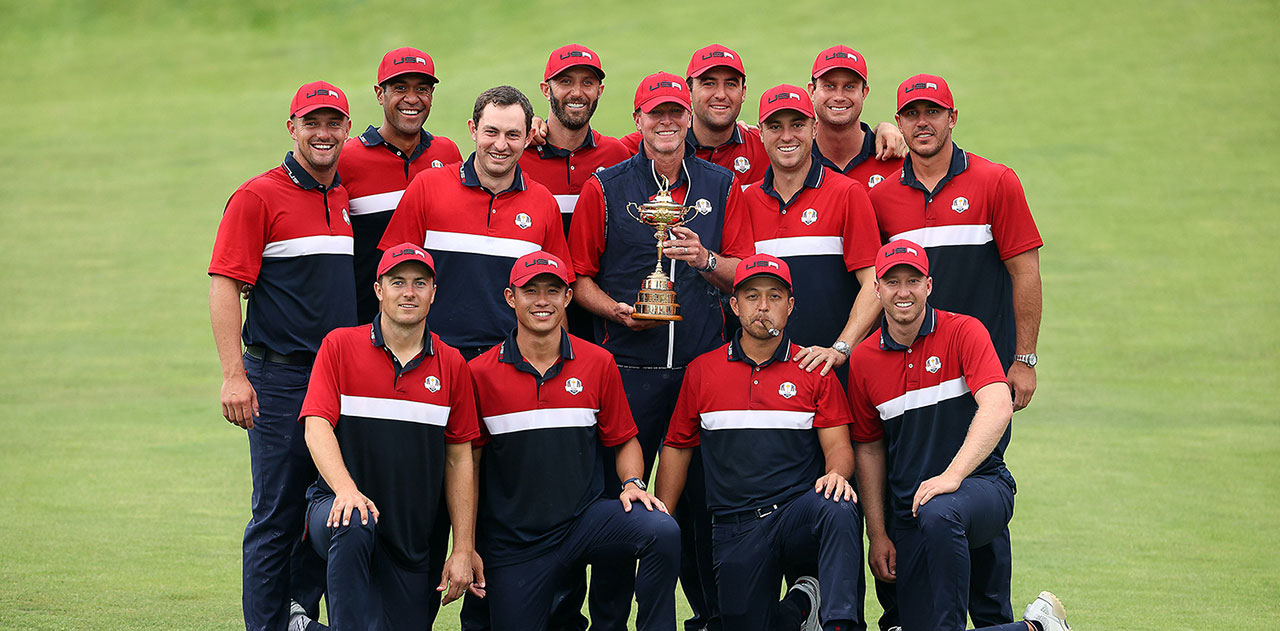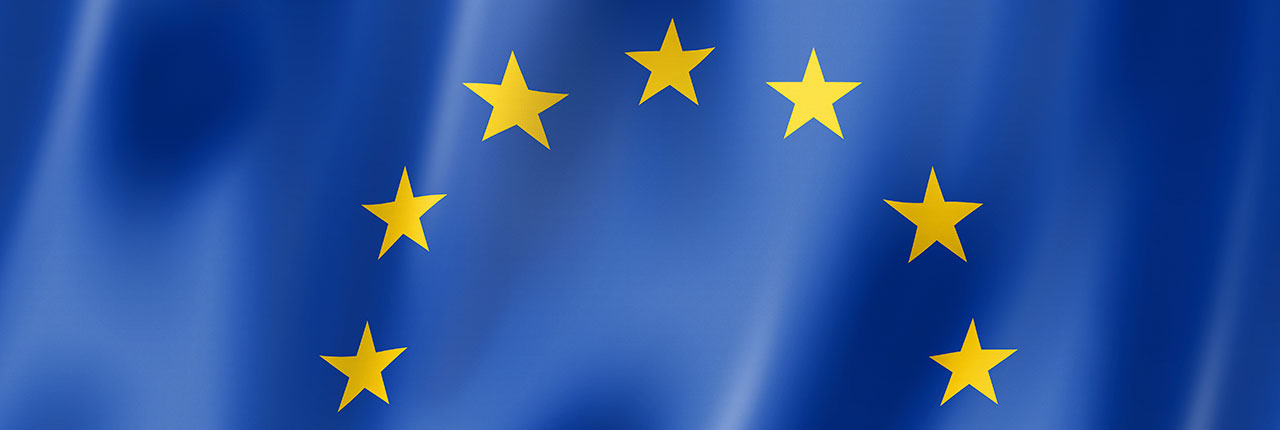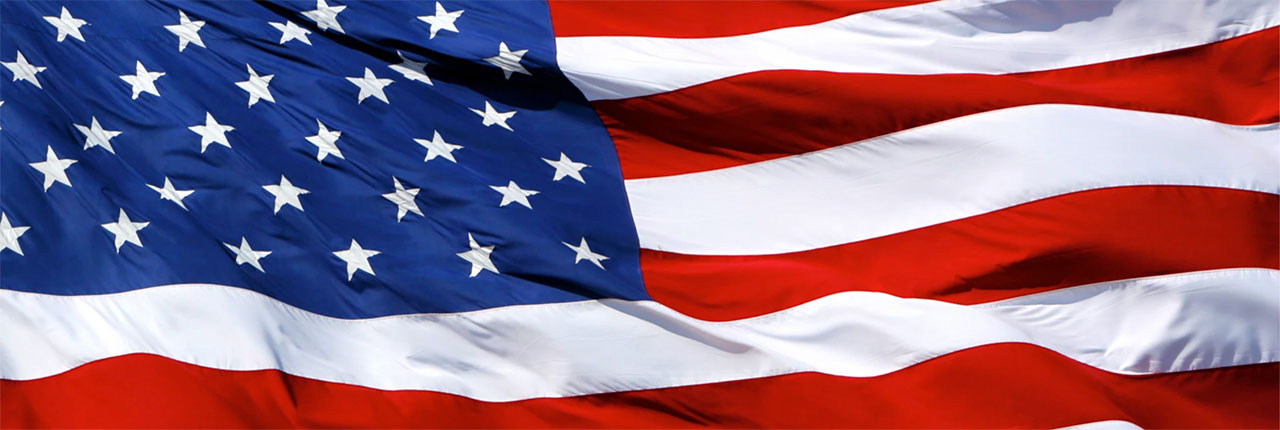Ryder Cup - Whistling Straits (Sep 21-26)
Posted by GolfBox on 26th Sep 2021
RYDER CUP UPDATE: (26/09/21)

The powerhouse US team dominated the 2021 Ryder Cup at Whistling Straits, with a comprehensive 19-9 flogging of their European rivals.
The result looked never in doubt heading into the Sunday singles, with the US holding a 11-5 lead after their pairings clicked in the Friday and Saturday fourballs and foursomes.
Rory McIlroy and Ian Poulter, who were tasked with playing the first match of the cup, provided a grim portent of what was to come by losing the first five holes against Patrick Cantlay and Xander Schauffele.
Only the Spanish pairing of world No.1 Jon Rahm and Sergio Garcia provided any resistance, winning all three of their matches over the first two days.
Dustin Johnson was chief oppressor for the US team, winning all five of his matches and bringing it with some of the best form he’s shown since winning the 2020 Masters.
And he was joined by flusher Collin Morikawa (3-0-1), an un-hatted Patrick Cantlay (3-0-1) and Olympic gold medallist Xander Schauffele (3-1) to essentially rip the European old guard to pieces even before the Sunday singles had begun.
Rory McIlroy was almost reduced to tears after beating Xander Schauffele on Sunday. After playing like it was Thursday at a major for the first two days, McIlroy admitted tearfully how much his teammates and the Ryder Cup meant to him – a raw and honest interview that was a real class act.
While the US team were far too good and a changing of the guard looms for the European side, no Ryder Cup comes without a complete absence of controversy.
While the partisan US crowds were mostly well behaved, there was a small percentage of fans that were deliberately disruptive when the European players were playing their shots.
Then there was Brooks Koepka’s meltdown at a rules official and petulant behaviour from both Justin Thomas and Bryson DeChambeau after being denied a gimme putt by their European rivals.
The Ryder Cup heads to Italy in 2023 and the US team will be hard to beat again with its core nucleus intact. For the Europeans, they’ll need to unearth the next wave of talent.
The biennial grudge match between the US and Europe is one of golf’s most anticipated events and this year’s version is shaping up to be another belter.
The US team will enjoy the home ground advantage, with the event played at Whistling Straits in Wisconsin from September 21-26.
But as previous Ryder Cups have shown, it matters little - three days of intense, pressure-filled match play inevitably finds the best team, regardless of where it is held.
As the excitement builds, here’s what the 2021 edition looks like:
THE TEAMS
| TEAM USA | TEAM EUROPE |
|
|
THE COURSE

Designed and built by Pete Dye on the shores of Lake Michigan, Whistling Straits is the kind of windswept, links-style course that makes even the best golfers in the world uncomfortable.
Dye transformed what was once a dead flat, abandoned airfield into something that would be right at home on the Irish coast.
The topography of Whistling Straits was kneaded and moulded to produce a classic mix of sloping fairways, greenside swales and a bevy of bunkers (over 1000).
Opened in 1998, Whistling Straits has never held a Ryder Cup but is no stranger to hosting the biggest events in golf – in 2004, 2010 and 2015 it held the US PGA Championship.
THE BIG GUNS
Leading the European side will be world No.1 Jon Rahm, who has enjoyed a stellar season.
The 26-year-old is in career-best form and will be playing his second Ryder Cup, after making his debut in Paris in 2018 – where he beat Tiger Woods in his singles match to earn his first point.
The European side will be banking on Rahm’s form continuing at Whistling Straits, with the Spanish superstar expected to be involved in most sessions.
Meanwhile, Dustin Johnson is the top ranked US player at No.2 in the world but his game hasn’t been flowing like it did last year.
Ever since winning the 2020 Masters in November last year, DJ has struggled to get his driver going.
And while he has won three of his four Ryder Cup singles matches, his record in the fourballs and foursomes matches hasn’t been great.
While Patrick Cantlay looks the in-form player for the US team, a possible Sunday singles showdown between Rahm and Johnson would produce one helluva show.
PARIS DISCORD
At the last Ryder Cup in 2018, played in Paris at Le Golf National, the US team were outgunned 16½ to 7½ by Europe.
It was a thumping win at a course set up to Europe’s advantage, with tight fairways, thick rough and water hazards countering the US team’s bomb-and-gouge approach.
A 4-0 whitewash in the Friday afternoon session set up the win, which was finalised when Phil Mickelson rinsed his ball on the 16 th on Sunday and conceded his match to Francesco Molinari.
While the on-course defeat stung the US, it wasn’t long before things got awkward.
Captain America himself, Patrick Reed, went rogue late on Sunday night and ignited a blame game.
He pointed the finger at US Captain Jim Furyk’s “buddy system” pairings for the defeat and publicly stated that Jordan Spieth, who he paired successfully with at the previous Ryder Cup, didn’t want to play with him.
Reed has been a top Ryder Cup performer but won’t be part of the US team this year, which should make US captain Steve Stricker’s job of building team unity a whole lot easier.
EUROPE’S WINNING RUN

On paper at least, European teams have always appeared inferior to their star-studded US opponents yet have claimed nine of the last 12 Ryder Cups.
It begs the question: do Europeans adjust better to a team environment that their American opponents?
The answer would appear to be yes, especially considering the world’s greatest golfer, Tiger Woods, has only ever been involved in one winning Ryder Cup team out of eight attempts.
Team chemistry is probably an overused reason for Europe’s domination given golf is essentially an individual game, but the Europeans seem to gel and most importantly, get their games hot at the right time.
Nine players in the US team are ranked inside the top 11 in the world, while world No.1 Jon Rahm is the sole European Ryder Cupper inside the world top 10, followed by Viktor Hovland (No.13) and Rory McIlroy (No.15).
But if the European team room replicates Ryder Cups of the past, especially with the Poulter factor, the seemingly under-gunned Europeans might just claim another underdog win.
STRICKER’S PICKS
Steve Stricker’s six captain’s picks weren’t a total surprise, with Tony Finau, Xander Schauffele, Jordan Spieth, Harris English, Daniel Berger and Scottie Scheffler basically picking themselves after strong performances this season.
Finau is one of the nicest guys in golf and his easy-going personality will probably be utilised by Striker in a pairing with either Koepka or DeChambeau at some stage.
And it wouldn’t surprise if Spieth is paired with Justin Thomas for most sessions.
Spieth’s stunning short game will dovetail well with Thomas’ long game and offset JT’s dud putting, which has bedevilled him all year.
Berger, English and Scheffler are all making their Ryder Cup debut at Whistling Straits, along with world No.3 Collin Morikawa.
BROOKS-BRYSON
Brooks Koepka and Bryson DeChambeau aren’t going to be the best of buddies at Whistling Straits given their well-publicised feud.
While US captain Steve Stricker will probably try to separate the star duo, he may be costing himself a formidable four-ball combination.
Playing Brooks and Bryson in one of the four-ball matches would no doubt inspire an extravaganza of extraordinary shot making and low scoring.
Forget about what their European rivals will be doing – Brooks and Bryson would probably try to outplay and outdo each other, creating a birdiefest that could very well have the match ending at the 12 th hole.
Sometimes a captain needs to think outside the box. If Stricker’s brave enough, he could be onto a winner with what would be a headline-grabbing pairing.
EUROPEAN EXPERIENCE
Viktor Hovland, Shane Lowry and Bernd Wiesberger will all make their Ryder Cup debuts this year but don’t expect them to go in as complete newbies at Whistling Straits.
Some of the senior member of the European team are among the most experienced in Ryder Cup history and will no doubt pass on their extensive knowledge.
Forty-eight-year-old Lee Westwood played his way onto the side and is the most experienced player on either team, with 10 previous Ryder Cups under his belt.
Ditto the aforementioned Poulter: the 45-year-old will be teeing up in his seventh cup.
Then there’s Sergio Garcia, who will be playing his 10 th Ryder Cup. He’s Europe’s all-time leading point scorer with 25.5 points to his name.
Wiesberger becomes the first player from Austria to represent Europe in a Ryder Cup.
POULTER THE POSTMAN

Europe captain Padraig Harrington didn’t hesitate to include veteran Ian Poulter as one of his captain’s picks, along with Shane Lowry and Sergio Garcia.
Englishman Poulter has been Europe’s talisman for over a decade and seems to grow two feet taller at the Ryder Cup.
His nickname of the Postman - because he always delivers - was well earned through his Ryder Cup heroics, the most notable being his starring role in sparking the greatest comeback in Ryder Cup history late on Saturday afternoon at Medinah Country Club in Illinois.
Ryder Cup matchplay is what Poulter lives and breathes for.
He has never lost a Ryder Cup singles match and his presence will no doubt loom large at some stage at Whistling Straits.
THE MIRACLE AT MEDINAH
Down 10-4 at one point late on Saturday and with the Ryder Cup seemingly headed into US hands, Europe’s win in the 2012 edition was one of the greatest comebacks in sport.
It was sparked by none other than Ian Poulter, who closed with five remarkable birdies to win his fourball match with Rory McIlroy and provide a glimmer of hope heading into the final day’s singles matches.
The belief it created led to a remarkable Sunday charge by the European side and Poulter was again in the thick of the action, winning his final two holes to beat Webb Simpson.
Europe claimed the first five matches on Sunday to take the lead, with the next four matches split evenly.
It came down to Germany’s Martin Kaymer, who was playing in the second-last match, to secure the final point Europe needed.
Staring at a six-foot putt on the final green to win his match against Steve Stricker, Kaymer calmly drained the putt to secure an incredible comeback that still reverberates today.
DJ’S WHISTLING STRAITS NIGHTMARE
While Jason Day won the 2015 US PGA Championship with a record under-par score of 20-under, Whistling Straits is probably best known for Dustin Johnson’s infamous bunker incident at the 2010 PGA Championship.
On the brink of winning his first major title, DJ was leading by one coming to the 72 nd hole.
But after he sprayed his drive 75 yards right off the tee, things got weird for the then 25-year-old.
DJ grounded his club in a patch of dirt before hitting his shot and it instantly rang alarm bells with the rules officials, who had told players at the start of the tournament that all sandy areas on the course should be treated like a bunker.
After putting out for a bogey, which would’ve forced a three-man playoff with Martin Kaymer and Bubba Watson, rules officials informed Johnson he’d incurred a two-stroke penalty.
It was a tough break for DJ, who finished fifth, and the fact that spectators had been standing in the very patch of dirt that Johnson’s ball ended up in further muddied the waters.
Johnson remarked after the round: “It’s where the crowd was standing, and generally the crowd doesn’t stand in a bunker.”
But the way DJ handled the situation was most impressive, shrugging it off and moving on – something he is the best in the game at doing.


